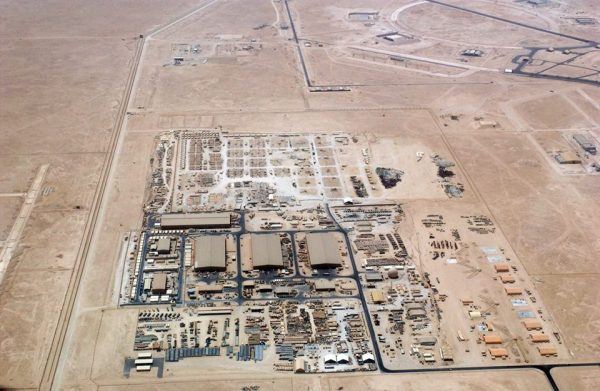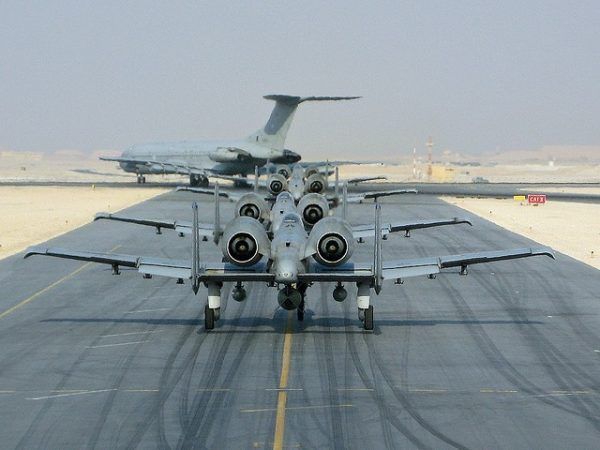The little Gulf kingdom of Qatar has found itself in the news quite a bit of late. Two stories in particular have been circulating fast through international media. The first story contained reports that the United States plans to expand the Al Udeid Air Base south of Doha, the biggest military facility used by Washington in the Gulf. According to the Qatar News Agency (QNA), the expansion works will include the construction of barracks and housing that holds more than 10,000 US personnel and other coalition militaries. QNA, which is state-run, took the opportunity to add some hype to the project’s significance: “The State of Qatar, along with its strategic US ally, is working on drawing up a roadmap for the future of bilateral relations, including the addition of Al Udeid Air Base to the list of US permanent military bases,” the outlet reported, adding that the base expansion will “underscore Qatar’s ongoing commitment to deepening its strategic military relations with the US.”
In a semi-awkward response, the Pentagon tried to downplay the construction at Al Udeid. “It is premature to discuss aspects of a potential base expansion at Al Udeid airbase in Qatar,” spokeswoman Lieutenant Commander Rebecca Rebarich said in a statement. “The US military is working with the Qatari ministry of defence on further details of the proposal to help us to plan appropriately and ensure we will use any new facilities effectively,” she said.
Despite the toned-down version from the Defense Department, the Al Udeid project is happening. According to Jane’s 360 satellite imagery, there is evidence that construction work is currently taking place in the southeast corner of the base and has been since at least late 2017. The official “ground breaking” ceremony, however, did not happen until July 24. At the event, Qatar’s Defense Minister Dr. Khalid bin Muhammad al-Attiyah also took the chance to highlight the construction’s deep relevance. Al Attiyah told the crowd along with US representative Air Force Brigadier General Jason Armagost that the groundbreaking “represented a reaffirmation of the deep military relations between the two countries.”

The second story involves the borderline comical events leading up to the visit of a Qatari diplomat to the United Kingdom.
On July 23, British media reported that the casting agency Extra People had advertised for paid extras to come and stand outside the gates of Prime Minister Theresa May’s official residence at 10 Downing Street. The extras were needed to stage a mock protest for when the emir of Qatar, Tamim bin Hamad Al Thani, made his visit to speak with May on July 24. Of course, Extra People doesn’t deal with political events. They provide extras (“background artists” is the polite term these days) for films and TV shows. Unfortunately, the agency didn’t realize the nature of the advert until after it had been posted online. “This is NOT a film or TV production,” read the job post, which offered £20 to respondents willing to take part. “The company are looking for a large group of people to fill space outside Downing Street during the visit of the president of Qatar. You will not have to do or say anything, they just want to fill space.” Extra People took down the ad and no protest was reported to have taken place. After news of the attempt to stage the demonstration, Qatari officials said the culprits were the country’s regional rivals, who have placed it under an economic blockade since last year. The vicious and expensive media war that ensued has often been fought through lobbyists, online advertising, and selective leaks to journalists in the West. Apparently hiring extras for fake protests is a favorite tactic of Qatar’s opponents.
The two episodes that have gotten Qatar in recent headlines on the surface seem to be unrelated. Yet in an interesting way, both highlight important developments for the nation’s role in the region and the future of its increasing importance to national strategies in the West.
Qatar has long been a strategic asset to the United States in the Gulf region. Beginning in 1992, Qatar put tremendous effort into building intimate military ties with the US. While not being the kingdom’s biggest weapons supplier, the US has sold Qatar important defense hardware. In 2014, the United States sold $11 billion worth of arms to Qatar, including AH-64 Apache attack helicopters and Patriot and Javelin defense systems. In June 2017, Qatar signed a $12 billion deal to buy 36 F-15QA strike aircraft from the United States.
After the withdrawal of American troops from bases in Saudi Arabia in 2003, the importance of the bases in Qatar became even more pronounced. Today, Qatar houses two very important US military bases. Sayliyah Army Base, also near Doha, is a supply hub that allows the American military to funnel weapons and equipment to its people all over the Middle East and Asia, including Iraq, Syria, and Afghanistan.

Al Udeid Air Base, the subject of recent news, is the largest concentration of US troops in the Middle East. It is the location of US Central Command’s Forward Headquarters and the Combined Air Operations Center that provides command and control of air power throughout Iraq, Syria, Afghanistan, and some 17 other nations. The scale of Al Udeid is certainly massive.The base boasts one of the longest runways in the Persian Gulf at 12,500 feet. The facility can accommodate up to 120 aircraft. Al Udeid is also home to substantial assets of the Royal Air Force of Britain, a country that has also stepped up military cooperation with Qatar in recent years. At almost the same time announcements of Al Udeid’s expansion hit the news, reports also came out on the newly formed joint English-Qatari air unit for training and regional operations.
So Qatar has certainly set itself up as an important ally for the West. And Al Udeid is the asset that most strongly embodies that partnership. It’s no wonder that the Qataris attempt to promote any positive development relating to the base.
However, there is another side to Qatar’s standing in the region.
In its attempt to garner friends and create ties with as many players as possible, Qatar has maintained ties with some of the more problematic people in its part of the globe. Qatar is the Sunni country most friendly with Iran. It still has an embassy in Tehran, as do the Iranians in Doha. Qatari officials still conduct high-level meetings with the Iranians on economic and security issues. This has stoked the anger of many of Qatar’s neighbors, especially Saudi Arabia, who severed ties with Tehran after attacks on its diplomatic installations in the country in 2016. Additionally, Qatar has quite a bit of terror financing running through its borders. The country has directly funded Hamas and its affiliate organization, the Muslim Brotherhood. It maintains ties to the Taliban in Afghanistan. There are known instances in which it has transferred funds to Shiite militias in Syria. All of this despite its official commitment to crack down on the sources for terror funding. It was these and other activities of Qatar that triggered the severing of relations by several Middle East countries a year ago and the blockade that followed.
In the past, even the US has weighed severing its relationship with Qatar. Former Defense Secretary Robert Gates stated in May 2017 that he doesn’t “know instances in which Qatar aggressively goes after [terror finance] networks of Hamas, Taliban, Al-Qaeda,” and that “My attitudes toward Al-Udeid and any other facility is that the United States military doesn’t have any irreplaceable [base].”
Luckily for Qatar, the general ambivalence and sometimes outright aggression toward the country has been offset by President Trump’s more welcoming attitude. Back in April, when Al Thani came to visit the White House, Trump praised the Sheikh for becoming a “big advocate” of combating terrorist financing, despite the fact that Trump initially sided with Saudi Arabia and others during the diplomatic crisis last year.
This is the background that has lead Qatar to assert itself more and more recently, as a tool of democracy and a friend of the West, and why officials want to promote every engagement with Western powers as much as possible.
What does all this mean for the future?
We can expect to see Qatar taking a stronger role in regional affairs, especially when it comes to things Washington has a strong interest in. There have already been some clear signs of this. Most recently, for instance, Qatar stepped in to mediate de-escalation between Hamas in Gaza and Israel, traditionally a role played by Egypt.
No doubt the US and its allies will continue to find more ways of capitalizing on Qatar’s newfound enthusiasm to cooperate.
















